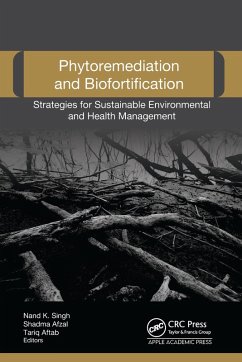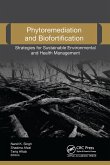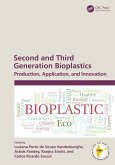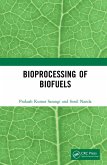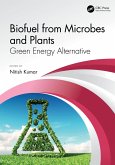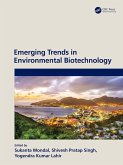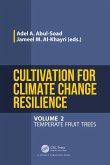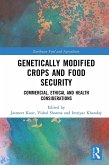Phytoremediation and Biofortification (eBook, ePUB)
Strategies for Sustainable Environmental and Health Management
Redaktion: Singh, Nand K.; Aftab, Tariq; Afzal, Shadma
128,95 €
128,95 €
inkl. MwSt.
Sofort per Download lieferbar

64 °P sammeln
128,95 €
Als Download kaufen

128,95 €
inkl. MwSt.
Sofort per Download lieferbar

64 °P sammeln
Jetzt verschenken
Alle Infos zum eBook verschenken
128,95 €
inkl. MwSt.
Sofort per Download lieferbar
Alle Infos zum eBook verschenken

64 °P sammeln
Phytoremediation and Biofortification (eBook, ePUB)
Strategies for Sustainable Environmental and Health Management
Redaktion: Singh, Nand K.; Aftab, Tariq; Afzal, Shadma
- Format: ePub
- Merkliste
- Auf die Merkliste
- Bewerten Bewerten
- Teilen
- Produkt teilen
- Produkterinnerung
- Produkterinnerung

Bitte loggen Sie sich zunächst in Ihr Kundenkonto ein oder registrieren Sie sich bei
bücher.de, um das eBook-Abo tolino select nutzen zu können.
Hier können Sie sich einloggen
Hier können Sie sich einloggen
Sie sind bereits eingeloggt. Klicken Sie auf 2. tolino select Abo, um fortzufahren.

Bitte loggen Sie sich zunächst in Ihr Kundenkonto ein oder registrieren Sie sich bei bücher.de, um das eBook-Abo tolino select nutzen zu können.
A comprehensive overview of phytoremediation and biofortification for sustainable environmental management. Topics include strategies that use nanotechnology; algae, fungi, and other plants; CRISPR/Cas9-mediated genome engineering; and more for decontamination of water and soil and for fortifying plants against climate change, etc.
- Geräte: eReader
- ohne Kopierschutz
- eBook Hilfe
- Größe: 7.33MB
Andere Kunden interessierten sich auch für
![Phytoremediation and Biofortification (eBook, PDF) Phytoremediation and Biofortification (eBook, PDF)]() Phytoremediation and Biofortification (eBook, PDF)128,95 €
Phytoremediation and Biofortification (eBook, PDF)128,95 €![Second and Third Generation Bioplastics (eBook, ePUB) Second and Third Generation Bioplastics (eBook, ePUB)]() Second and Third Generation Bioplastics (eBook, ePUB)52,95 €
Second and Third Generation Bioplastics (eBook, ePUB)52,95 €![Bioprocessing of Biofuels (eBook, ePUB) Bioprocessing of Biofuels (eBook, ePUB)]() Prakash Kumar SarangiBioprocessing of Biofuels (eBook, ePUB)21,95 €
Prakash Kumar SarangiBioprocessing of Biofuels (eBook, ePUB)21,95 €![Biofuel from Microbes and Plants (eBook, ePUB) Biofuel from Microbes and Plants (eBook, ePUB)]() Biofuel from Microbes and Plants (eBook, ePUB)54,95 €
Biofuel from Microbes and Plants (eBook, ePUB)54,95 €![Emerging Trends in Environmental Biotechnology (eBook, ePUB) Emerging Trends in Environmental Biotechnology (eBook, ePUB)]() Emerging Trends in Environmental Biotechnology (eBook, ePUB)54,95 €
Emerging Trends in Environmental Biotechnology (eBook, ePUB)54,95 €![Cultivation for Climate Change Resilience, Volume 2 (eBook, ePUB) Cultivation for Climate Change Resilience, Volume 2 (eBook, ePUB)]() Cultivation for Climate Change Resilience, Volume 2 (eBook, ePUB)49,95 €
Cultivation for Climate Change Resilience, Volume 2 (eBook, ePUB)49,95 €![Genetically Modified Crops and Food Security (eBook, ePUB) Genetically Modified Crops and Food Security (eBook, ePUB)]() Genetically Modified Crops and Food Security (eBook, ePUB)42,95 €
Genetically Modified Crops and Food Security (eBook, ePUB)42,95 €-
-
-
A comprehensive overview of phytoremediation and biofortification for sustainable environmental management. Topics include strategies that use nanotechnology; algae, fungi, and other plants; CRISPR/Cas9-mediated genome engineering; and more for decontamination of water and soil and for fortifying plants against climate change, etc.
Dieser Download kann aus rechtlichen Gründen nur mit Rechnungsadresse in A, B, BG, CY, CZ, D, DK, EW, E, FIN, F, GR, HR, H, IRL, I, LT, L, LR, M, NL, PL, P, R, S, SLO, SK ausgeliefert werden.
Produktdetails
- Produktdetails
- Verlag: Taylor & Francis eBooks
- Seitenzahl: 410
- Erscheinungstermin: 6. Februar 2024
- Englisch
- ISBN-13: 9781000895278
- Artikelnr.: 69634639
- Verlag: Taylor & Francis eBooks
- Seitenzahl: 410
- Erscheinungstermin: 6. Februar 2024
- Englisch
- ISBN-13: 9781000895278
- Artikelnr.: 69634639
- Herstellerkennzeichnung Die Herstellerinformationen sind derzeit nicht verfügbar.
Nand K. Singh, PhD, is Associate Professor in the Department of Biotechnology at the Motilal Nehru National Institute of Technology Allahabad, Prayagraj, Uttar Pradesh, India. Dr. Singh has more than 14 years of teaching and research experience in genetics, genetic engineering, plant biotechnology, genomics and proteomics, molecular biology, recombinant DNA technology, metabolic engineering, and bioinformatics. He is the recipient of several fellowships at both national and international levels. Currently, he is involved with a number of national research projects with different government organizations. To date, Dr. Singh has authored two books with national and international publishers. He has supervised 8 doctorate, 20 M.Tech. and 40 B.Tech. students as a mentor. He also has to his credit more than 60 research publications in peer-reviewed international journals and 20 book chapters in edited volumes with international publishers. Dr. Singh completed his doctorate in Biotechnology at the Indian Institute of Technology Roorkee, India. Shadma Afzal, M.Sc., is a research scholar at the Motilal Nehru National Institute of Technology, Allahabad, Prayagraj, India. Miss. Afzal received her postgraduate degree in Botany from the University of Allahabad, Prayagraj, India. She is an awardee of the CSIR-NET (2017 and 2018) in Life Science, UGC-NET (2017) in Environmental Science, and GATE in Life Science (2019). Her research interests include nanotechnology, plant biotechnology, physiology, and molecular biology. She has published more than 20 articles in international journals as well as 10 chapters in books. Findings of her research works have been published in the Journal of Materials Science, Planta, Journal of Biotechnology, Environmental Science and Pollution Research, Plants, Journal of Plant Growth Regulation, Biotechnology Letters, and Journal of Genetics.She is also member of various societies. Tariq Aftab, PhD, is currently an Assistant Professor in the Department of Botany at Aligarh Muslim University, India, where he earned his PhD. He is a recipient of a prestigious Leibniz-DAAD fellowship from Germany, a Raman Fellowship from the Government of India and a Young Scientist Award from the State Government of Uttar Pradesh (India) and Government of India. After completing his doctorate, he worked as a Research Fellow at the National Bureau of Plant Genetic Resources, New Delhi, and as Postdoctorate Fellow at Jamia Hamdard, New Delhi, India. Dr. Aftab was also a Visiting Scientist at the Leibniz Institute of Plant Genetics and Crop Plant Research (IPK), Gatersleben, Germany, and in the Department of Plant Biology, Michigan State University, USA. He is a member of various scientific associations in India and abroad. He has edited over 11 books with international publishers, including Elsevier, Springer Nature, and CRC Press/Taylor & Francis Group; co-authored several book chapters; and written over 60 research papers in peer-reviewed international journals. His research interests include physiological, proteomic, and molecular studies on medicinal and aromatic plants.
1. Recent Advances and Challenges in Bioremediation and Biofortification 2.
Nanoremediation: A New and Emerging Technology 3. Algae-Mediated Fresh
Water Phytoremediation 4. Algae as Agents for the Reclamation of
Wastewater: A Green Surrogate for Decontamination 5. Plant- Assisted
Bioremediation of Heavy Metals in Soil and Water 6. Mangroves as an
Effective Tool of Phytoremediation and Its Implication on Agricultural Land
in Estuarine Zones 7. Plant-Assisted Bioremediation of Heavy Metals 8.
Molecular and Physiological Attributes Regulating Phytoremediation
Potential of Plants 9. Role of Engineered Nanoparticles in Fortification of
Plant Nutrients 10. Genetic and Agronomic Biofortification of Zinc in Maize
and Sweetcorn (Zea mays L.) 11. Biofortification of Crop Plants: The Role
of Arbuscular Mycorrhizal Fungi 12. Stable Crops Biofortified with
Increased Protein, Oils, and Vitamins 13. Biofortification of Iron for
Nutrition and Simultaneous Bioremediation of Iron-Contaminated Soil 14.
CRISPR/Cas9-Mediated Genome Engineering for Production of Biofortified
Crops 15. Algae and Fungi-Based Micronutrients Enrichment in Food 16.
Nutritional Revolution: Biotechnological Strategies for Fortified Crop
Produce
Nanoremediation: A New and Emerging Technology 3. Algae-Mediated Fresh
Water Phytoremediation 4. Algae as Agents for the Reclamation of
Wastewater: A Green Surrogate for Decontamination 5. Plant- Assisted
Bioremediation of Heavy Metals in Soil and Water 6. Mangroves as an
Effective Tool of Phytoremediation and Its Implication on Agricultural Land
in Estuarine Zones 7. Plant-Assisted Bioremediation of Heavy Metals 8.
Molecular and Physiological Attributes Regulating Phytoremediation
Potential of Plants 9. Role of Engineered Nanoparticles in Fortification of
Plant Nutrients 10. Genetic and Agronomic Biofortification of Zinc in Maize
and Sweetcorn (Zea mays L.) 11. Biofortification of Crop Plants: The Role
of Arbuscular Mycorrhizal Fungi 12. Stable Crops Biofortified with
Increased Protein, Oils, and Vitamins 13. Biofortification of Iron for
Nutrition and Simultaneous Bioremediation of Iron-Contaminated Soil 14.
CRISPR/Cas9-Mediated Genome Engineering for Production of Biofortified
Crops 15. Algae and Fungi-Based Micronutrients Enrichment in Food 16.
Nutritional Revolution: Biotechnological Strategies for Fortified Crop
Produce
1. Recent Advances and Challenges in Bioremediation and Biofortification 2.
Nanoremediation: A New and Emerging Technology 3. Algae-Mediated Fresh
Water Phytoremediation 4. Algae as Agents for the Reclamation of
Wastewater: A Green Surrogate for Decontamination 5. Plant- Assisted
Bioremediation of Heavy Metals in Soil and Water 6. Mangroves as an
Effective Tool of Phytoremediation and Its Implication on Agricultural Land
in Estuarine Zones 7. Plant-Assisted Bioremediation of Heavy Metals 8.
Molecular and Physiological Attributes Regulating Phytoremediation
Potential of Plants 9. Role of Engineered Nanoparticles in Fortification of
Plant Nutrients 10. Genetic and Agronomic Biofortification of Zinc in Maize
and Sweetcorn (Zea mays L.) 11. Biofortification of Crop Plants: The Role
of Arbuscular Mycorrhizal Fungi 12. Stable Crops Biofortified with
Increased Protein, Oils, and Vitamins 13. Biofortification of Iron for
Nutrition and Simultaneous Bioremediation of Iron-Contaminated Soil 14.
CRISPR/Cas9-Mediated Genome Engineering for Production of Biofortified
Crops 15. Algae and Fungi-Based Micronutrients Enrichment in Food 16.
Nutritional Revolution: Biotechnological Strategies for Fortified Crop
Produce
Nanoremediation: A New and Emerging Technology 3. Algae-Mediated Fresh
Water Phytoremediation 4. Algae as Agents for the Reclamation of
Wastewater: A Green Surrogate for Decontamination 5. Plant- Assisted
Bioremediation of Heavy Metals in Soil and Water 6. Mangroves as an
Effective Tool of Phytoremediation and Its Implication on Agricultural Land
in Estuarine Zones 7. Plant-Assisted Bioremediation of Heavy Metals 8.
Molecular and Physiological Attributes Regulating Phytoremediation
Potential of Plants 9. Role of Engineered Nanoparticles in Fortification of
Plant Nutrients 10. Genetic and Agronomic Biofortification of Zinc in Maize
and Sweetcorn (Zea mays L.) 11. Biofortification of Crop Plants: The Role
of Arbuscular Mycorrhizal Fungi 12. Stable Crops Biofortified with
Increased Protein, Oils, and Vitamins 13. Biofortification of Iron for
Nutrition and Simultaneous Bioremediation of Iron-Contaminated Soil 14.
CRISPR/Cas9-Mediated Genome Engineering for Production of Biofortified
Crops 15. Algae and Fungi-Based Micronutrients Enrichment in Food 16.
Nutritional Revolution: Biotechnological Strategies for Fortified Crop
Produce
